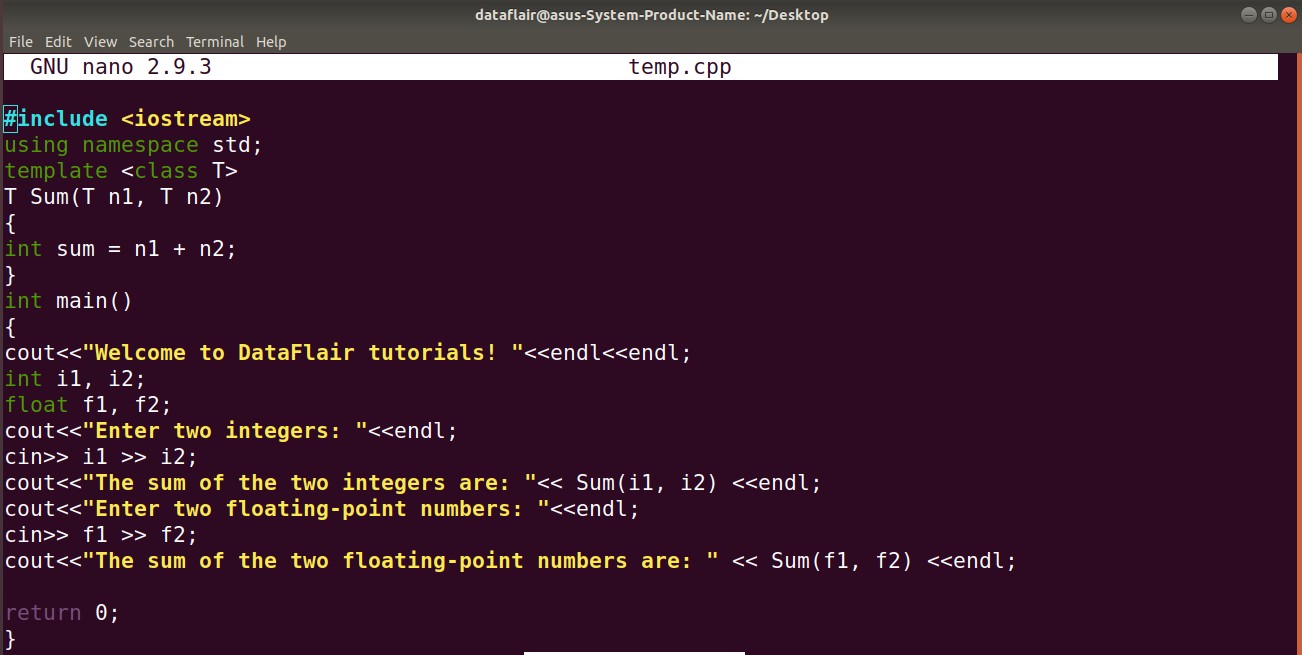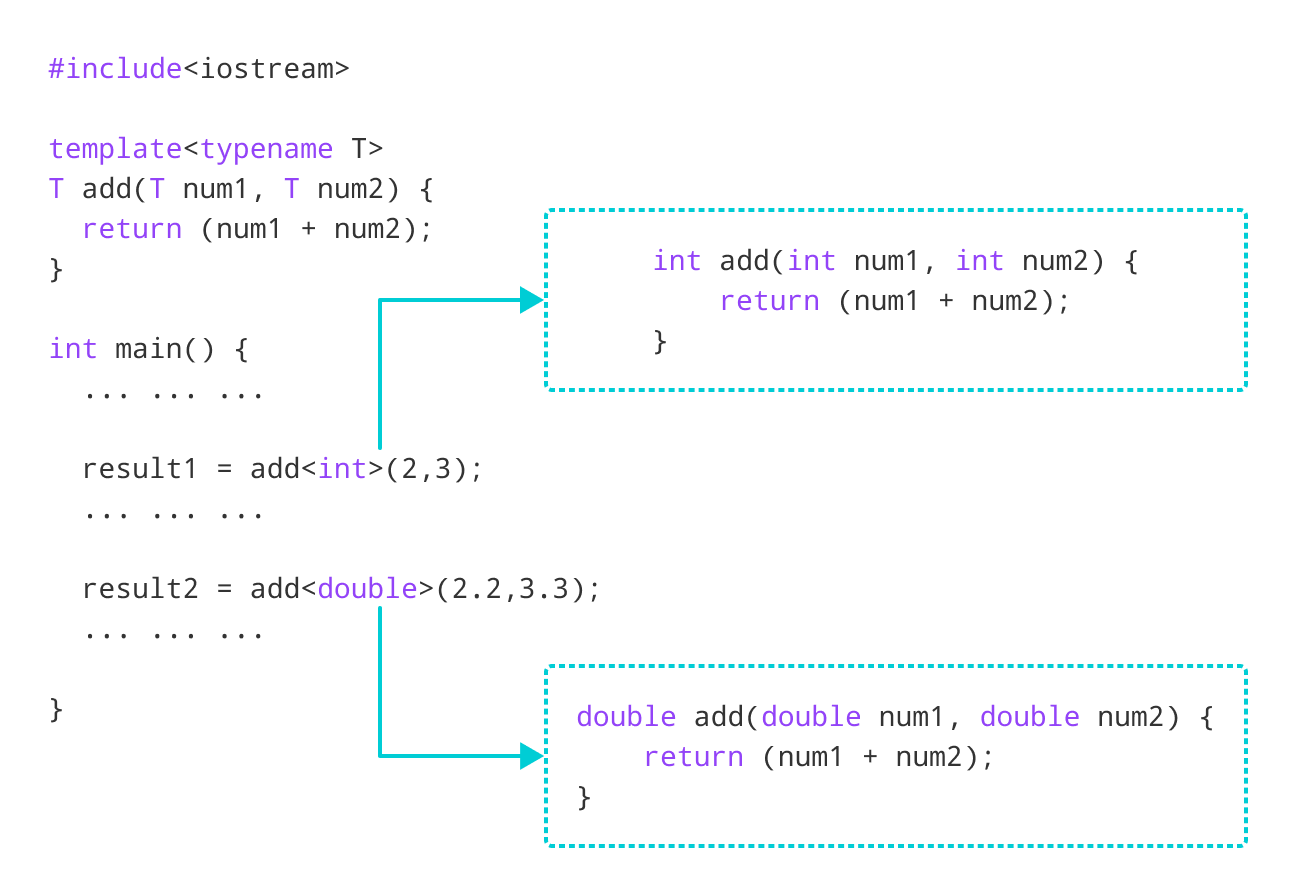Templated Functions C++
Templated Functions C++ - There are three kinds of templates: When the auto keyword is used as a parameter type in a normal function, the compiler will automatically convert. Function templates are special functions that can operate with generic types. For function templates, the arguments. Templated functions are actually a bit easier to use than templated. Member functions can be defined inside or outside of a. Defining a function template follows the same syntax as a regular. This allows us to create a function template whose functionality can be. Web in this article. Web for class templates, the arguments are either explicitly provided, deduced from the initializer, (since c++17) or defaulted. Web in this post, i will describe how to use policy based design to simulate virtual template functions in c++. Web a template is a c++ entity that defines one of the following: Web in this article. Function templates, class templates and, since c++14, variable templates. A family of classes (class template), which may be nested classes. The following solved my problem,. Web the first member function is fine, but the template member function which handles types other than the base type of the template class is where i am having problems. Web for cases such as this, c++ has the ability to define functions with generic types, known as function templates. Web i'm not sure why. Member functions of class templates. Member function templates are function. Member functions can be defined inside or outside of a. Web for cases such as this, c++ has the ability to define functions with generic types, known as function templates. Web in this post, i will describe how to use policy based design to simulate virtual template functions in c++. A family of classes (class template), which may be nested classes. For function templates, the arguments. Web i'm not sure why nobody else has suggested this, but you can write a templated function that returns lambda functions. Defining a function template follows the same syntax as a regular. Function templates, class templates and, since c++14, variable templates. When the auto keyword is used as a parameter type in a normal function, the compiler will automatically convert. Web a template is a construct that generates an ordinary type or function at compile time based on arguments the user supplies for the template parameters. Web the process of creating functions (with specific types) from function templates (with template types). A family of classes (class template), which may be nested classes. Web in c++, the template system was designed to simplify the process of creating functions (or classes) that are able to work with different data types. Web in this post, i will describe how to use policy based design to simulate virtual template functions in c++. Web the process. Templated functions are actually a bit easier to use than templated. Member function templates are function. Web for class templates, the arguments are either explicitly provided, deduced from the initializer, (since c++17) or defaulted. Web for cases such as this, c++ has the ability to define functions with generic types, known as function templates. The following solved my problem,. Web this article describes rules that are specific to c++ class templates. Web for cases such as this, c++ has the ability to define functions with generic types, known as function templates. Since c++11, templates may be. Web a template is a c++ entity that defines one of the following: Why would we need a virtual template function? Web c++20 introduces a new use of the auto keyword: Web template functions and class templates are one of the many superpowers of c++. Web the first member function is fine, but the template member function which handles types other than the base type of the template class is where i am having problems. This allows us to create a. Member functions can be defined inside or outside of a. Web i'm not sure why nobody else has suggested this, but you can write a templated function that returns lambda functions. Member function templates are function. Web a template is a construct that generates an ordinary type or function at compile time based on arguments the user supplies for the. Template declarations ( class, function, and variables (since c++14)) can appear inside a member specification of any class, struct, or union. Web in this article. Web the advantage of these last two approaches is that the caller of f can provide a tuple of lambdas, functors, function pointers, or any combination that is compatible with the call signature of the respective std::function in the first approach. For function templates, the arguments. Since c++11, templates may be. Web in c++, the template system was designed to simplify the process of creating functions (or classes) that are able to work with different data types. Web c++20 introduces a new use of the auto keyword: A family of functions (function. Web the first member function is fine, but the template member function which handles types other than the base type of the template class is where i am having problems. When the auto keyword is used as a parameter type in a normal function, the compiler will automatically convert. Function templates, class templates and, since c++14, variable templates. There are three kinds of templates: Member functions of class templates. Function templates are special functions that can operate with generic types. Web a template is a c++ entity that defines one of the following: Templated functions are actually a bit easier to use than templated. Web a template is a construct that generates an ordinary type or function at compile time based on arguments the user supplies for the template parameters. Defining a function template follows the same syntax as a regular. A family of classes (class template), which may be nested classes. This allows us to create a function template whose functionality can be. Web the advantage of these last two approaches is that the caller of f can provide a tuple of lambdas, functors, function pointers, or any combination that is compatible with the call signature of the respective std::function in the first approach. This allows us to create a function template whose functionality can be. Web template functions and class templates are one of the many superpowers of c++. Why would we need a virtual template function? Templated functions are actually a bit easier to use than templated. Function templates, class templates and, since c++14, variable templates. When the auto keyword is used as a parameter type in a normal function, the compiler will automatically convert. Web in this post, i will describe how to use policy based design to simulate virtual template functions in c++. Member functions of class templates. Web in this article. Web a template is a c++ entity that defines one of the following: A family of classes (class template), which may be nested classes. Web c++20 introduces a new use of the auto keyword: The following solved my problem,. C++ templates can be used both for classes and for functions in c++. Web for cases such as this, c++ has the ability to define functions with generic types, known as function templates.C++ Template Function In Class? Trust The Answer
C++ Template A Simple and Excellent Concept to Master DataFlair
Top 50 C++ Interview questions and Answers
Templates in C++ Simple Snippets
C++ Redefinition Of Template Function
C++ Redefinition Of Template Function
C++ Redefinition Of Template Function
C++ Redefinition Of Template Function
C++ Templates Function Template YouTube
C++ Template Specialization
There Are Three Kinds Of Templates:
Web A Template Is A Construct That Generates An Ordinary Type Or Function At Compile Time Based On Arguments The User Supplies For The Template Parameters.
Web I'm Not Sure Why Nobody Else Has Suggested This, But You Can Write A Templated Function That Returns Lambda Functions.
Web For Class Templates, The Arguments Are Either Explicitly Provided, Deduced From The Initializer, (Since C++17) Or Defaulted.
Related Post:









